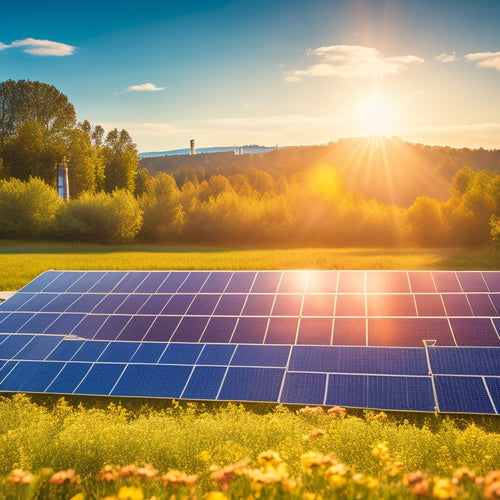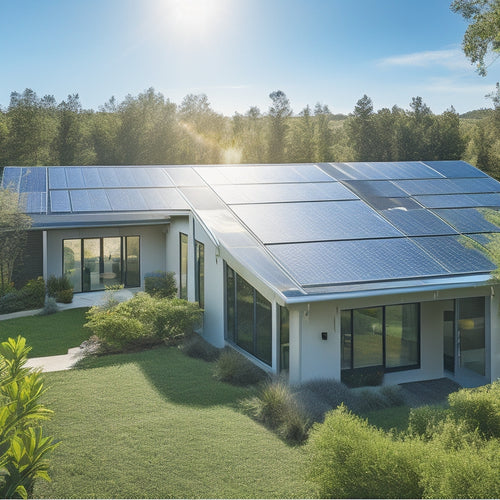
Solar Power Battery for House
Share
You're considering a solar power battery for your house, which means you want a reliable and efficient way to store excess energy generated by your solar panels for later use, reducing your reliance on the grid and minimizing your energy bills. A suitable battery should provide a steady power supply during non-sunny periods, reduce high energy bills, and enable energy independence. When selecting a battery, consider factors like cycle life expectancy, depth of discharge, and material efficiency to guarantee peak performance. By understanding these key aspects, you'll be well on your way to utilizing the full potential of solar power for your home, and there's more to investigate to get the most out of your setup.
The Essentials
- A solar power battery for a house stores excess energy from solar panels for night use or outages, reducing grid dependence and energy bills.
- Lithium-ion batteries are a popular choice for home solar power systems due to their high efficiency, long lifespan, and reliability.
- Effective energy management is crucial for maximizing energy independence and ensuring proper battery performance and longevity.
- Considerations such as cycle life expectancy, depth of discharge, and daily discharge cycles are essential for selecting the right solar power battery for a house.
- Proper maintenance practices, such as temperature control and avoiding deep discharges, are necessary to extend the lifespan of a solar power battery.
Renewable Energy Storage Solution
You're likely considering a renewable energy storage solution to guarantee a steady power supply when the sun isn't shining. That's where energy storage systems come in, enabling you to store excess energy generated by your solar panels during the day for use at night or during power outages.
By alleviating the burden of high energy bills and reducing grid dependence, you can enjoy greater energy independence and potential cost savings sustainable energy solutions.
With a reliable power backup solution in place, you can enjoy uninterrupted electricity and reduce your reliance on the grid.
Energy Storage Systems
Several households and businesses are now adopting renewable energy sources, such as solar power, to reduce their reliance on fossil fuels and mitigate climate change. As you consider making the switch, you'll need an energy storage system to guarantee a steady supply of power.
This system is vital for storing excess energy generated by your solar panels during the day, so you can use it at night or during power outages. A reliable battery for your solar panel system can provide a stable source of backup power during outages, allowing homeowners to store excess energy generated during the day for use at night or on cloudy days, and increasing the overall return on investment by maximizing energy independence solar panel battery.
You'll want to focus on battery efficiency, as it directly impacts the overall performance of your energy storage system. Look for batteries with high depth-of-discharge (DOD) ratings, as they can store more energy per charge. Effective energy management is also key. You'll need a system that can monitor your energy usage, predict your needs, and adjust energy distribution accordingly.
A well-designed energy storage system will give you the freedom to enjoy uninterrupted power, while also reducing your carbon footprint. By choosing the right battery and energy management system, you'll be able to exploit the full potential of your solar power setup and enjoy a more sustainable, independent lifestyle.
Power Backup Solutions
When the grid goes down, your solar power system can keep on generating - but only if you've got a reliable power backup solution in place. You can't rely on the grid to always be available, which is why a power backup solution is vital. This is especially true if you live in an area prone to frequent outages or natural disasters.
With a power backup solution, you can guarantee that your lights stay on, your fridge stays cold, and your communication devices stay connected. By integrating a high-quality home battery storage solutions with your solar panel system, you can store excess energy generated during the day for use during off-peak hours or emergencies.
A renewable energy storage solution like a solar power battery provides you with the freedom to generate and store your own energy. This means you're not dependent on the grid, and you can enjoy the solar installation benefits of reduced energy bills and a lower carbon footprint.
To get the most out of your power backup solution, make certain to follow proper battery maintenance tips, such as monitoring your battery's state of charge, keeping it at room temperature, and avoiding deep discharging. By doing so, you can rest assured that your power backup solution will be ready when you need it most.
Reduced Carbon Footprint Guarantee
By switching to a solar power battery for your house, you're tapping into a clean energy source that greatly reduces your reliance on fossil fuels.
This means you'll be emitting lower levels of greenhouse gases, contributing less to climate change, and enjoying a reduced carbon footprint.
With the ability to capture renewable energy and employ efficient home solar panels, you'll be well on your way to minimizing your environmental impact.
With a solar power battery, you can rest assured that you're doing your part to minimize your environmental impact today.
Clean Energy Source
Often, homeowners seeking eco-friendly alternatives to traditional energy sources turn to solar power, which offers a reduced carbon footprint guarantee. By utilizing the energy from the sun, you can greatly reduce your reliance on fossil fuels and lower your environmental impact. Solar power is a clean energy source that promotes sustainable living and energy efficiency.
| Benefits | Description | Advantages |
|---|---|---|
| Energy Conservation | Reduces energy consumption from the grid | Lower electricity bills |
| Grid Independence | Allows you to generate your own power | Freedom from grid outages |
| Environmental Impact | Reduces carbon emissions and pollution | Contributes to a cleaner environment |
| Home Automation | Integrates with smart home systems | Convenient and efficient energy management |
| Cost Savings | Reduces energy costs and increases property value | Long-term savings and increased property value |
As you consider shifting to a clean energy source, it's important to understand the benefits of solar power. By investing in a solar panel system, you can enjoy the advantages of energy conservation, grid independence, and cost savings while promoting sustainable living and reducing your environmental impact.
Lower Emissions Today
As you shift to solar power, you're taking a significant step towards reducing your carbon footprint, which is an essential aspect of promoting sustainable living.
By capturing the power of the sun, you're decreasing your reliance on fossil fuels and minimizing your contribution to greenhouse gas emissions.
With solar technology advances, you can now store excess energy generated during the day for use at night or during power outages, further reducing your carbon footprint.
Deep Cycle Battery Design
When designing a deep cycle battery for your solar power system, you'll want to take into account the construction materials used, as they considerably impact the battery's overall performance and lifespan.
The type of materials employed will influence the battery's ability to withstand the repeated charge and discharge cycles, which is vital for a solar power battery.
In addition, it's important to verify that your battery system is safe and reliable, providing home energy during outages and grid independence.
You should also assess the cycle life expectancy, which typically ranges from 300 to 1,200 cycles, depending on the battery's chemistry and quality.
Battery Construction Materials
Your deep cycle battery's construction materials play a crucial role in its overall performance and lifespan. The type of materials used can greatly impact the battery's efficiency, durability, and overall cost.
When it comes to battery types, lead-acid batteries are a popular choice for off-grid solar power systems due to their affordability and established manufacturing processes. However, they've lower material efficiency compared to newer technologies like lithium-ion batteries.
Lithium-ion batteries, on the other hand, offer higher material efficiency, longer lifetimes, and faster charging capabilities. They're a great option for those who want a more efficient and compact solar power system.
When selecting a deep cycle battery, it's vital to take into account the material efficiency of the battery, as it directly affects the overall system's performance and cost. Look for batteries with high material efficiency ratings to guarantee you're getting the most out of your solar power system.
Cycle Life Expectancy
In conjunction with material efficiency, cycle life expectancy is a vital factor in deep cycle battery design, directly impacting the overall performance and lifespan of your solar power system.
You need to understand that a battery's cycle life expectancy is the number of charge and discharge cycles it can handle before its capacity drops below 80% of its initial value. This is essential because it affects your battery's lifespan and, subsequently, your solar power system's overall performance.
When choosing a deep cycle battery, you should look for one with a high cycle life expectancy, typically above 2,500 cycles. This guarantees your battery will last longer and require less maintenance.
Proper maintenance practices, such as keeping your battery at the right temperature, avoiding deep discharges, and confirming correct charging, can also extend its lifespan.
Check Battery Depth of Discharge
When you're checking your solar power battery's depth of discharge, you need to be aware of the limits to prevent damaging the battery.
Many homeowners who invest in solar energy storage solutions, such as the Tesla Powerwall or LG Chem RESU, understand the importance of monitoring their battery's depth of discharge solar battery storage systems.
You'll want to monitor the daily discharge cycles to guarantee you're not exceeding the recommended depth of discharge, which varies by battery type.
Depth of Discharge Limits
Frequently, homeowners overlook a significant aspect of maintaining their solar power battery for house: Depth of Discharge (DOD) limits.
You should know that DOD refers to the percentage of a battery's capacity that's been used. For instance, if you've used 50% of your battery's capacity, the DOD is 50%. Understanding DOD limits is important because it directly affects your battery's discharge efficiency and longevity.
If you consistently push your battery beyond its recommended DOD limit, you'll reduce its lifespan. Most solar power batteries are designed to operate within a specific DOD range, typically between 20% and 80%.
Staying within this range guarantees you maximize discharge efficiency while minimizing wear and tear on your battery. Exceeding the recommended DOD limit can cause irreversible damage, leading to reduced capacity and overall performance.
Daily Discharge Cycles
Monitoring daily discharge cycles is essential to checking your battery's depth of discharge, as it directly impacts its overall performance and lifespan. You need to keep track of how much energy you're using daily and adjust your consumption accordingly.
A deep discharge cycle occurs when your battery is drained to its maximum capacity, which can reduce its overall efficiency.
To optimize battery efficiency, you should aim for partial discharge cycles, typically between 20% to 80% of the battery's capacity. This will help prolong its lifespan and maintain its overall health.
Effective energy management is key to achieving this. You can use energy monitoring systems to track your daily energy usage and adjust your consumption patterns accordingly.
Lithium-Ion Long Cycle Life
You're looking for a solar power battery that can store energy for a long time, and lithium-ion batteries fit the bill.
With a long cycle life, these batteries can recharge and discharge many times without losing their capacity, providing you with long-lasting energy storage.
In fact, a well-maintained lithium-ion battery can last for 15 to 20 years or more, making it a reliable choice for your solar power system.
Long-Lasting Energy Storage
A reliable solar power battery for your house requires a sturdy energy storage system, and lithium-ion batteries with long cycle life are an excellent choice.
You'll enjoy the benefits of solar energy, including reduced energy bills and a lower carbon footprint, when you pair them with a durable battery system.
Lithium-ion batteries with long cycle life can store excess energy generated by your solar panels during the day, allowing you to use it at night or during power outages. This means you'll have a consistent supply of clean energy, even when the grid is down.
To get the most out of your lithium-ion batteries, follow these battery maintenance tips: keep them at room temperature, avoid deep discharging, and monitor their state of charge.
By doing so, you'll guarantee your batteries last for thousands of cycles, providing you with years of reliable energy storage.
With a well-maintained lithium-ion battery system, you'll experience the full benefits of solar energy, including energy independence and a reduced reliance on the grid.
Frequently Asked Questions
Can I Use Solar Power Batteries for My RV or Camper?
You can definitely use solar power batteries for your RV or camper, opting for deep-cycle RV battery types that support solar charging options, allowing you to capture the sun's energy for off-grid excursions and freedom on the open road.
How Often Should I Inspect and Maintain My Solar Power Battery?
You should inspect your solar power battery every 3-6 months, following a maintenance checklist to guarantee peak performance and extend battery lifespan; regular checks will give you freedom from unexpected downtime and unexpected repair costs.
Are Solar Power Batteries Compatible With Existing Electrical Systems?
You wonder if solar power batteries can seamlessly integrate with your existing electrical setup, and the answer is yes, they can, thanks to advanced solar panel integration, ensuring ideal energy storage efficiency and a smooth changeover to renewable energy.
Can I Install Solar Power Batteries Myself or Do I Need a Professional?
When it comes to DIY installation, you'll need to assess your electrical knowledge; if unsure, it's recommended to hire a pro, as safety considerations like proper wiring and voltage management are essential to avoid risks and guarantee a successful install.
Are Solar Power Batteries Covered by Any Warranties or Guarantees?
You'll find that most solar power batteries come with a warranty, typically ranging from 5-15 years, covering defects and performance guarantees, ensuring your investment is protected throughout its expected lifespan of 15-30 years or more.
Final Thoughts
As you utilize the power of the sun, you're not just illuminating your home - you're casting a shadow on your carbon footprint. With a solar power battery for your house, you're investing in a cleaner tomorrow. This deep cycle battery design guarantees a smooth changeover to renewable energy, and its lithium-ion long cycle life assures a lasting impact. By checking the battery's depth of discharge, you'll find peace of mind in the reliability of your eco-friendly choice.
Related Posts
-

Advantages of Solar Generating Systems Over Traditional Energy
Solar generating systems provide several key advantages over traditional energy sources. You'll experience lower long...
-

Key Components of a Reliable Emergency Power Supply System
A reliable emergency power supply system requires several key components. You need proven performance metrics to guar...
-

Installing Metal Solar Roofs for Maximum Energy Efficiency
Installing metal solar roofs can drastically enhance your home's energy efficiency and durability. These roofs withst...


